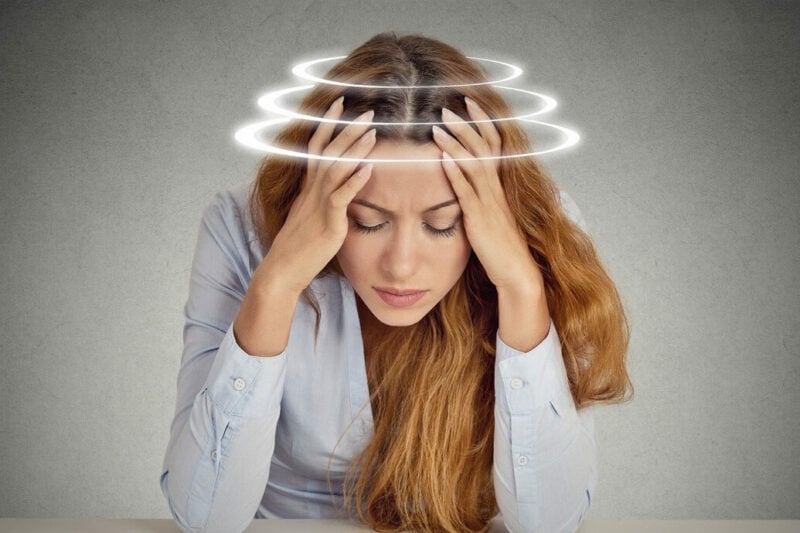Description of Vertigo
Vertigo results from:
either a malfunction of the vestibular system, located in the inner ear,
either neurological or cerebral damage.
Typically the vestibular system allows us to maintain our balance in association with sight and proprioceptive sensitivity (sensation of the position of our body in space).
Therefore, an anomaly of the vestibular machine, the nerves, or the mind related to it, generates a struggle between the one-of-a-kind facts acquired by using our brain, which results in stability disorders or sensations together with a lack of balance. Or the impact that the surroundings around us (walls, ceiling, items) are spinning.

Types of Dizziness
There are four types of vertigo:
Positional dizziness, lasting some seconds, could occur at some stage in or on the cease of the movement. It may be, for example, benign paroxysmal vertigo among the most frequent.
Violent dizziness, lasting more than 12 hours. They can be linked to vestibular neuritis, a cerebrovascular accident (CVA), the consequences of head trauma, or a chronic infection of the ear which is damaging the centers of balance... These are for some emergencies and you must quickly contact a doctor.
Recurrent dizziness that lasts a few hours. They'll in particular be because of Ménière's disease, an ailment, or a tumor of the ear.
Unsteadiness or ataxia, feeling out of balance when standing or walking may be related to neurological or vestibule problems.
Causes of Vertigo
Benign paroxysmal positional vertigo, with cupulolithiasis or sialolithiasis (it accounts for 30% of dizziness)
Chronic otitis or ear diseases: perilymphatic fistula, middle ear cholesteatoma, infectious labyrinthitis, tumor, otosclerosis, etc.
Vestibular neuritis or labyrinthitis (irritation of the nerves in the internal ear)
Trauma to the internal ear with rock fracture or labyrinthine concussion.
Intoxication (alcohol, tablets, coffee, remedy)
A tumor (VIII neuroma)
Ménière's disorder (sickness of the internal ear of unknown beginning)
Some disorders impaired the blood supply to the ears of Beethoven.
Alteration of blood moves within the structures of the mind accountable for posture
Neurological disorders (stroke, intracranial hypertension, head trauma)
Vertigo Diagnosis
If you experience vertigo or dizziness, a doctor should be consulted, especially if accompanied by other symptoms such as nausea, vomiting, difficulty with balance or walking, loss of hearing, and Tinnitus (hissing and humming perceived via the challenge).
The doctor asks the person suffering from vertigo about their onset, frequency, duration, triggers, possible falls, feelings, and history to find the cause.
The scientific examination specializes in the ear canals and the eardrum, the stability capacities explored a way to some maneuvers, on the motion of the eyes.
Additional examinations will in some cases identify what triggers vertigo: blood tests, hearing tests such as an audiogram, cardiac assessment, and medical imaging (scanner, MRI of the inner ear).
The physician ought to be consulted urgently if everybody reviews or notices:
Loss of partial (blurred, double vision) or overall imaginative and prescient,
Issue standing
Trouble communicating
Peculiar conduct or if he plays bizarre moves.
A surgical operation is now and then essential in a few instances and continually depending on the foundation of vertigo.
Vertigo Treatments
The treatment of lightheadedness depends on its origin. they'll be treated higher if the cause is known.
The analysis can sometimes result in emergency hospitalization to treat a stroke.
To make mild attack point lightheadedness disappear, the ENT doctor (otolaryngologist) or a therapist will perform specific rocking maneuvers geared toward mobilizing and dispersing the small stones at the origin of this lightheadedness.
In case of proprioception redness, the specialist can impose, within the 1st 2 days,
medication working on the proprioception structures of the ear:
calming antihistamines
antiemetics for nausea and unconditioned reflex,
tranquilizers to fight anxiety.
Subsequently, proprioception redness most frequently develops favorably, and it's then treated quickly (by physiotherapy)
This treatment is interrupted if the lightheadedness is said to be AN adverse drug impact.
Complementary Approaches To Treat dizziness
Once the causes of severe vertigo are eliminated, many natural ways will be helpful to limit or maybe for good cure vertigo.
Osteopathy
Insofar as dizziness is joined to a cervical drawback, one or 2 treatment sessions will be enough to correct the matter. in a craniosacral approach, the therapist can work gently, notably on the neck, skull, and pelvis (cranio-sacral approach).
Homeopathy
Granules of Phosphorus and white bryony in nine CH area units help fight against all styles of dizziness. Ideally, five pellets ought to be taken each hour, as before long because the initial symptoms seem. an equivalent remedy is employed as a background treatment at the speed of three granules doubly each day.
If nausea and emesis area unit is associated, the genus Cocculus indicus is usually recommended.
If vertigo will increase in the morning upon waking, it's judicious to show to genus Cocculus aluminum oxide.
If there's associate degree intolerance to noises, it's higher to like Theridion curassavicum.
Thanks for visiting Mods TN


0 Comments